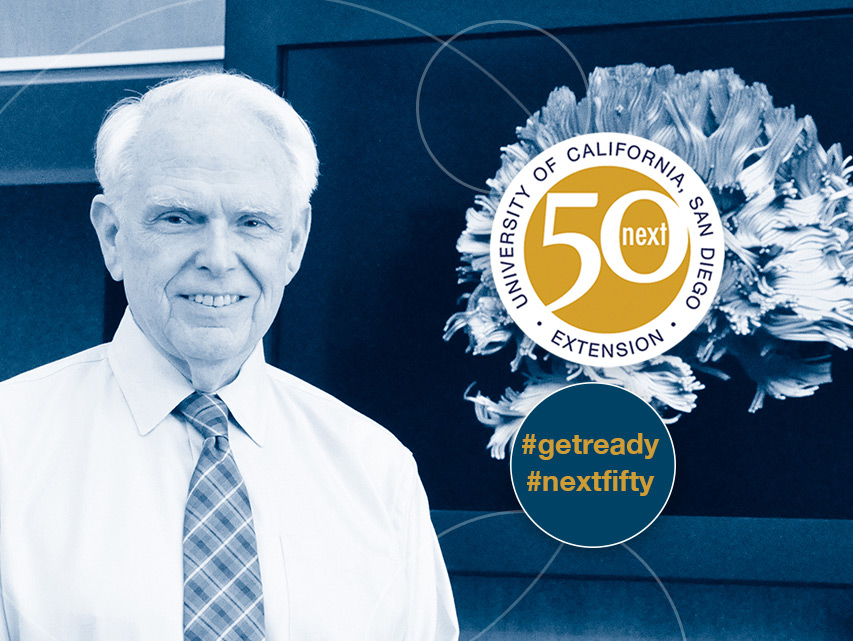12 July 2016
50 Voices of the Future: William Mobley imagines life without Alzheimer's

In honor of UC San Diego Extension's first 50 years, 50 Voices of the Future asks thought leaders about the trends, breakthroughs and social advances they foresee over the next 50 years.
Dr. William Mobley believes a cure for Alzheimer’s disease is a distinct possibility. In 50 years “Kids will learn about it in school,” says Mobley, who chairs UC San Diego’s Department of Neurosciences. “They’ll say, in the old days, there was this terrible illness called Alzheimer’s disease, but treatments were discovered that prevent it in San Diego. That changed everything for dealing with that disease.”
If anybody can help make that happen, it’s Mobley, one of the world’s leading experts in neurodegenerative disorders. These days he’s hard at work trying to understand the way neurons communicate with each other. The occasional breakdown of these communications can lead to diseases such as Alzheimer’s, Down syndrome and Huntington’s disease.
What are the odds of finding a cure for these diseases in the next 50 years? “Hard to state probability,” Mobley says. “Better not to be weighed down by probabilities - just do it.”
(1) Why is the work you do important?
Our focus is on the mechanisms that underlie neurodegenerative diseases like Alzheimer’s diseases and Huntington’s disease and Down syndrome. The brain is a machine that links neurons together in networks. The integrity of those networks depends upon a two-way communication, from neuron #1 to neuron #2 and from neuron #2 back to neuron #1. We want to understand how it is, in the case of Alzheimer’s disease or Down syndrome or Huntington’s disease, how the system fails. Once we understand that, we’re in a position to basically reverse the disease process or prevent it.
(2) What are the influential/exciting developments happening in your field now and why?
Exciting things include technological advances that will let us see how the brain works; advances that let us understand the underlying mechanisms by which neurons talk to each other and communicate effectively. We can devise systems that let us look at how neurons talk to one another and what information they exchange. That lets you look at normal communication, the changes that occur in disease models, and allow those models to teach us about what goes wrong. The other advances are the genetic and technical discoveries. The tools that allow us to modify genes, so we can understand what impact a mutation might have. It’s a wonderful opportunity to understand the underlying mechanisms and test therapies.
(3) What’s the next big thing?
I think the next big things are therapies to treat Alzheimer’s disease. I think we can have effective treatments by 2025. Why not? And that changes everything. Because now Alzheimer’s disease currently considered an oncoming epidemic, is aborted. Or at least it is made less severe in older people and in younger people perhaps completely prevented.
(4) How big of an impact will your field play in shaping the future of the San Diego region and beyond?
I think we have a chance here in San Diego to do for other disorders what we’re trying to do right now for Alzheimer’s disease. So I could see UC San Diego and the other institutions on the Mesa – making really, really important observations in a number of diseases – Huntington’s disease and autism and a number of diseases that at present are underserved - this biomedical community is a kind of a paradise, for work of this kind. I would argue that San Diego could be not just a player but a frontrunner, a leader, for solving these problems, especially for the brain but for other disorders as well.
(5) Hop into your time machine…what does the future look like for this field in 50 years? How can individuals/companies get prepared for what’s next?
In 50 years, hopefully Alzheimer’s disease, Parkinson’s disease, Huntington’s disease, and ALS – all of these really terrible disorders – are no longer a problem. We have treatments or cures for all of them. And then finally we’ll then be able to turn our attention to enhancing human life, using studies of brain science, to deal with issues of empathy, compassion, to learn the brain basis behind anger, dismay, hopelessness and to gain insights needed to deal with any number of issues that face society. Benefiting from great brain science, we can begin to deal more effectively with the human condition.
Explore the Science and Healthcare programs and courses that UC San Diego Extension offers including a range of certificate programs in areas such as Clinical Trials and Biotechnology Project Management, and discover more about neuroscience on The Brain Channel on UCTV.